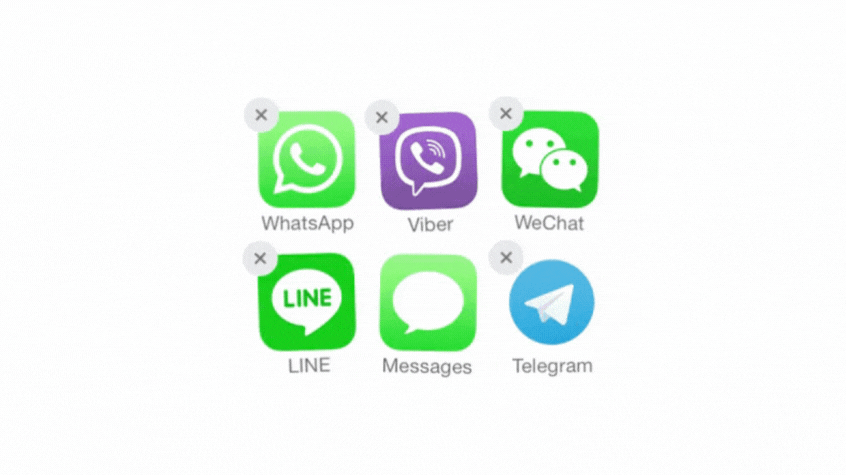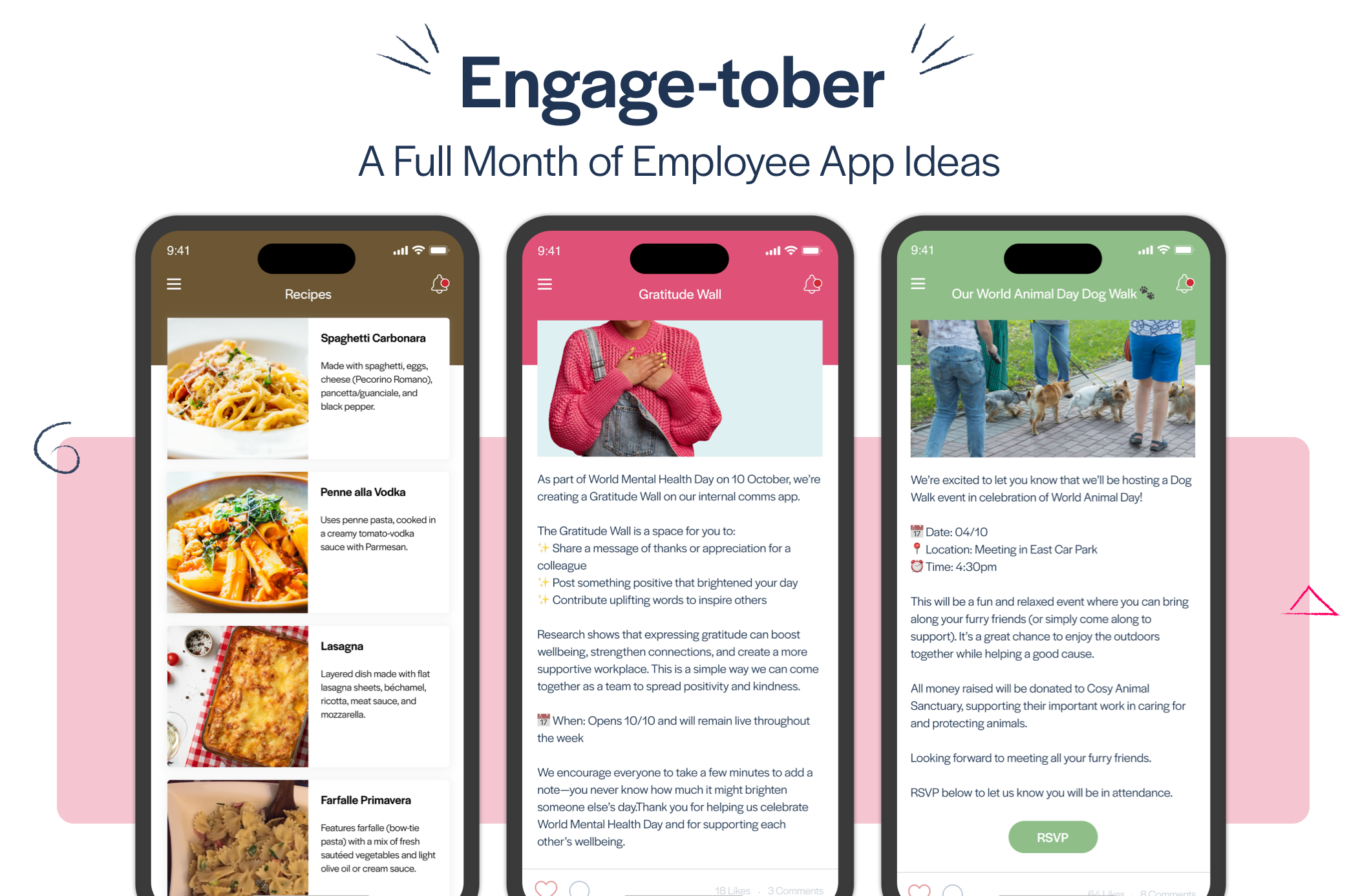
Blog
How Informal WhatsApp Use Is Creating Problems for Your Business
WhatsApp has become the go-to chat tool for employees in many organisations. Especially those with deskless or dispersed teams. It’s easy, familiar, and free. But here’s the problem: it was not designed for work.

What is the Problem with WhatsApp?
WhatsApp’s issues for workplace communication are easy to spot—and they’re not unique. Apps like WeChat, Telegram, Line, Signal, Viber, and even iMessage all share a fundamental flaw: they weren’t built for business.
As organisations double down on employee experience, risk management, and internal culture, the question isn’t just which messaging tool to use—it’s whether your communication infrastructure is actually fit for purpose.
It’s not just about picking something new. It’s about building a stronger, safer, and more connected organisation from the inside out.

The Risk You Can’t Afford to Ignore
If you work in HR, internal comms, operations, or IT, you’ve likely faced one of these WhatsApp-related headaches:
1. Zero Visibility for HR and Leadership
Employees share everything—from shift changes to personal messages—inside WhatsApp groups. If someone shares inappropriate or harmful content, HR can't see it, report it, or intervene. This lack of oversight can lead to serious cultural and, with growing frequency, legal consequences.
As one client put it:
“If we could prevent those messages being sent in the first place—and give HR a way to report and review chats—it could help avoid serious reputational damage.”
2. Ex-Employees Still Have Access
WhatsApp is tied to personal numbers. This means former staff often remain in groups long after they’ve left. Still able to view sensitive updates and information. Offboarding is manual—if it happens at all.
3. Ownership Lock-In
When the person who created a WhatsApp group leaves, no one else can manage it. That means teams often need to rebuild groups from scratch. Causing confusion, duplication, and missed communication.
4. Privacy Risk by Default
All group members can see each other’s personal phone numbers. Leaving employers open to accusations of enabling unwanted contact or violating privacy policies.
5. No GDPR Compliance or Audit Trails
Without admin control, WhatsApp makes it hard to enforce GDPR and keep audit records. This poses a serious risk for any organisation that deals with sensitive or regulated information. Particularly in Healthcare, Local Authorities, and Emergency Services.
Why It Matters for Regulated Sectors
In these industries, data protection isn’t optional, it is enforced by law:
Healthcare: Must follow Article 9 of GDPR for special category data and national health data rules. Failure to control access or prove consent puts patient privacy and public trust at risk.
Local Authorities: Must follow GDPR, Freedom of Information (FOI), and public accountability rules. Any lack of audit trails weakens their ability to respond to data requests or complaints.
Emergency Services: Often handle personal data in high-stakes or distressing situations. They should follow the Information Commissioner’s Office (ICO) guidance. This is important for secure and recorded communication, especially during emergencies or investigations.
Real-World Failures Have Consequences
Even at the highest levels, poor WhatsApp governance has serious consequences. In 2023, UK Ministry of Defence military planning documents were leaked. A journalist was mistakenly added to a WhatsApp group, intended for internal use only. The incident led to a big security review. It showed how easily sensitive information can get into the wrong hands when basic controls are missing.
The “Ignore It and Hope” Strategy
Not all organisations formally approve the use of WhatsApp—but many have looked the other way as it becomes the default for day-to-day communication among employees. This “hands-off” approach often stems from good intentions: respecting autonomy, avoiding friction, or simply lacking a clear alternative.
But when something goes wrong—whether it’s a data breach, HR issue, or compliance failure—the company is still held responsible. And the reality is: unless you offer a secure, easy-to-use alternative, informal WhatsApp use will continue.

So Why Do Teams Keep Using It?
Because it’s easy. Because it’s familiar. Plus, many companies can’t justify switching. They see the tool as another comms app.
But here’s what has changed:
Internal communication is now tied to compliance, culture, and even retention.
Deskless and frontline workers want the same connectivity they have in their personal lives.
And most importantly, leaders are under pressure to do more with less.
What they need is a solution that’s easy to roll out, affordable at scale, and proven to make a difference.
What Internal Leaders Actually Need
You’re not just looking for a chat app. You need a solution that:
Connects deskless, shift-based, or dispersed employees
Enables real-time communication that’s company-controlled
Provides reporting and visibility for HR and comms
Protects employee privacy
Is compliant, secure, and easy to roll out
Improves engagement and supports a healthy culture
No matter if you run a local council, logistics, public transport, or healthcare trust, your aim is clear: enhance communication, lower risk, and create a connected workforce.
Thrive: Built for People-First Organisations
Thrive isn’t just another app, it’s a tool for cultural transformation. Across sectors, our clients use Thrive to:
Keep employees updated with critical info in real time
- Secure Document Sharing like; policies, rotas, training, wellbeing updates, and more
Boost employee recognition and inclusion
Ensure compliance with GDPR and internal protocols
Remove reliance on unsafe, unmanageable tools like WhatsApp
Here's how Thrive compares:

Interested in learning more about the Thrive platform?
What Thrive Customers Are Saying
Organisations across sectors—from local councils to logistics, transport to communications—have already made the switch from consumer messaging apps to Thrive. Why? Because they needed something more secure, more inclusive, and actually designed for the way their people work.
Here’s what some of our clients have to say about the difference it’s made:

The app has transformed our internal communication. For many staff, it is now their go-to place for news and key info
Helen Hawkins
Head of Communications, Biffa
You can check our more of our customer reviews and case studies here.
It’s Time to Move Beyond WhatsApp
You’ve worked hard to build a culture that values inclusion, safety, and engagement. Don’t let legacy tools like WhatsApp undermine that.
Thrive offers a secure, scalable, and simple alternative—purpose-built for organisations that care about their people and their reputation.
Need to see how it stacks up in real life?
Book a quick demo— no jargon, no pushy pitch. Just a walkthrough of how Thrive could fit your team or start a free trial today.
Book a Demo
Book a demo here. Instant calendar access. No tech setup needed. Public sector–friendly.
Start a Free Trial.
Let's get your started with a free trial here. Book in for a 15-min discussion to get up your free trial.
Got questions first?
Get in touch and we’ll talk it through.









